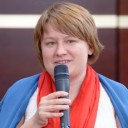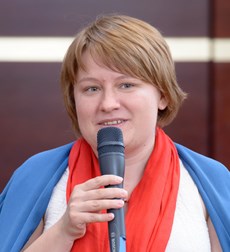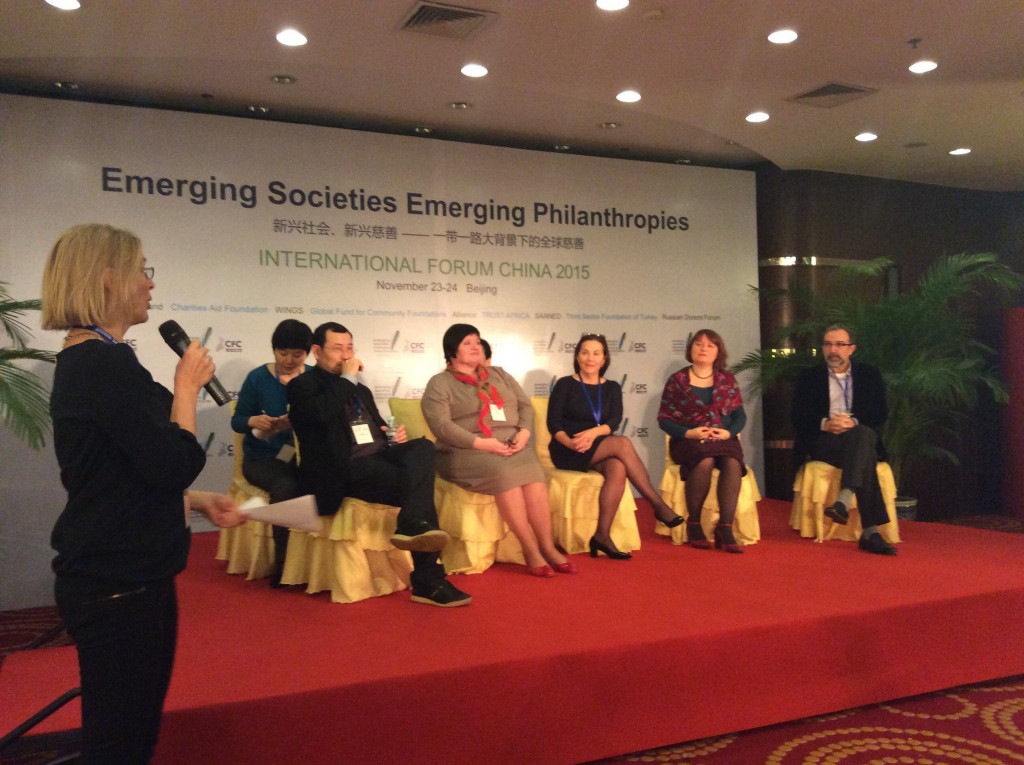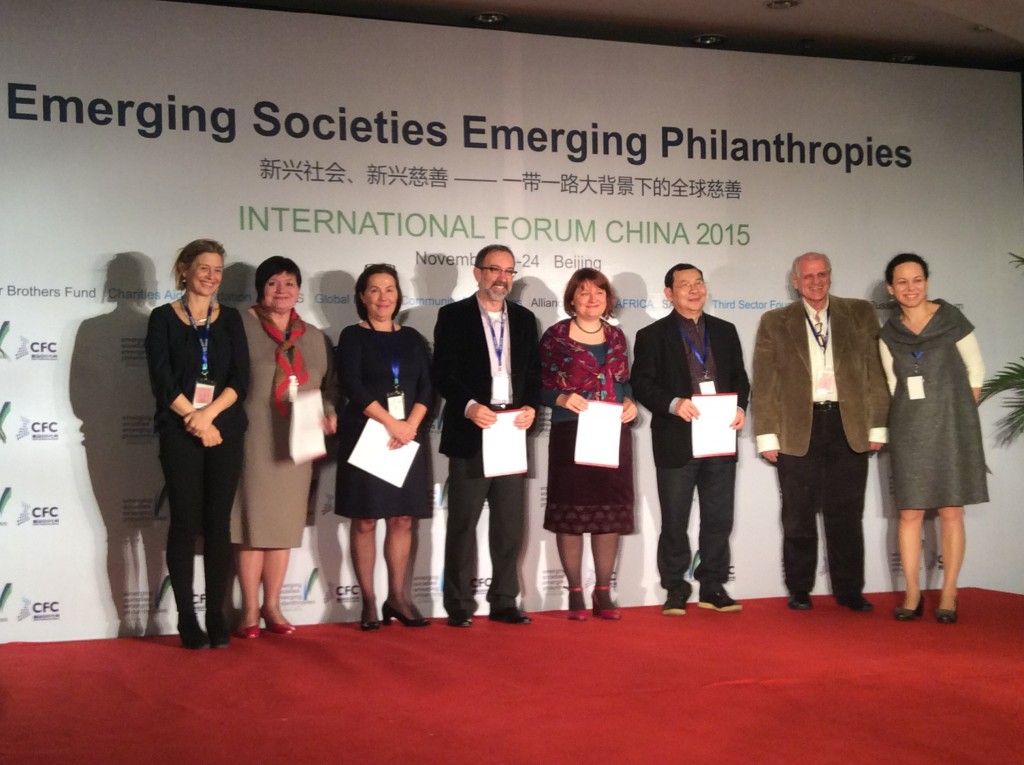Olga Alexeeva Memorial Prize is a great honor and a deeply meaningful recognition of my contribution to philanthropy.
Firstly, due to its connection to the memory of Olga: I remember her courageous, clear and strong voice at the international conferences that I attended. She was an advocate for philanthropy, but also for reflecting critically on our work and doing philanthropy well. Olga stands in my memory as a person of high integrity and high standards, as someone for whom half measures are not enough, who is great at identifying the next step and seeing the potential of each situation. I am grateful for the community of philanthropy professionals around the world who took on the responsibility of managing the Award. Though this, they are bringing to surface inspirational leaders and great work in the field of philanthropy globally, expanding the reach of these practices. Thank you for keeping Olga’s voice strong. Thank you for carrying her legacy. Thank you for taking the next step for a community of sharing, learning and appreciation between peers working to expand philanthropy in contexts in which it is not yet mainstream.
Secondly, this prize is meaningful because it can be celebrated among peers. I know that all of you in this room and all those nominated for the award understand clearly the challenges in emerging societies: lack of trust, defensiveness, inequality, poor governance and poor institutional capacity to tackle complex social issues. But all of you being here are also aware of the great potential that our societies hold in terms of growing resources and talents as well as a genuine willingness and joy to give, be engaged and contribute. All of you here are the optimists in our societies who were willing to see the potential, the process of the glass filling, even when it was not yet half full. But you are also the realists who have to deal with the daily obstacles towards achieving this potential. It takes courage, it takes determination and most of all it takes persistence. Many of my fellow nominees have been engaged in this work for at least 10 years and sometimes longer. I am honored to be part of a community of philanthropy practitioners in emerging societies, one that understands, values and appreciates the complexity as well as creativity of this work.
Thirdly, it is very meaningful to me that this nomination came from the Romanian community foundations, a field that I have helped build and expand. This feedback from the field and the genuine appreciation beyond divides of institutional politics, in a context in which we’re better at criticizing than supporting those who take leadership, was deeply moving to me. Genuine appreciation, like philanthropy, is truly a gift. It cannot be demanded, it can only be offered. Genuine appreciation, like philanthropy, helps build communities and heals the wounds of division and isolation that we feel in our work. It also helps foster and expand the talents inside that community.
The Romanian community foundations movement has grown in the last ten years, from an idea to 15 foundations (and still counting). More than 40% of the Romanian population has now access to a community foundation, and newer ones can base their work on the experiences of other communities.
The success for the community foundations in Romania is not the result of my work. It is the result of many talented and inspiring leaders – both from community foundations, but also from partners, donors and support organizations in Romania and internationally. My role was rather in building and safeguarding a space where all these talents and resources could come together and strengthen each other; a long term perspective that offered inspiration and guidance; and a fierce belief that through steady work, obstacles will gradually dissolve, that even if we don’t yet know how, we will learn to make it through.
I have brought to this work the values of my generation and my cultural space. I was 13 when Romania has changed a long-term totalitarian regime and started with high hopes, but fragile steps, to build itself as a democratic society, learning from the experience of other countries and reconnecting with its own past. But even before this change, signs of freedom were growing stronger in society. I remember vividly my Romanian language teacher and class master who even before the change encouraged us strongly to think for ourselves, when the mode of operation was to learn by heart what other people were thinking. English gave me access to a world of experience in the field of civil society and philanthropy. I was 19 when I translated a workshop on advocacy, 21 when I started a local branch of a democracy NGO, 25 when I led a research on the grantmakers support for NGOs in Romania.
Being a part of the international philanthropic community, I have learned about community foundations being centers of hope, about the need to invest trust and look for leaders who will be there ten years onward, carrying their work with passion. C.S. Mott Foundation, WINGS, Global Fund for Community Foundations, The Center for Philanthropy and Civil Society at CUNY, Center for Philanthropy Slovakia, UK, Canada and US (community) foundations networks have provided opportunities for learning for me and my Romanian colleagues and we are deeply grateful for this support. I listened to professionals around the world, but more importantly I have observed them in action and been inspired by their work and leadership. This way, I could create my own understanding of what good philanthropy practice is. Then I tried it out and learned from what was working and what was failing. Having received all this knowledge and support, there was no choice but to pass it forward, to encourage leaders of communities to find their inspiration and then refine their own understanding through action and reflection. I have recently heard the story of a donor who felt morally obliged to donate for a scholarship because his grandfather had been supported as well to get higher education more than 50 years ago. We know from our experience that generosity multiplies. Each gift we make will motivate others to give as well and each courageous act we take will inspire others too. So please keep doing this good work.
Some highlights of community foundations work in Romania:
- over 1.5 million US$ were invested in local communities through more than 1000 grants and 500 scholarships.
- over 10,000 donors contributed only in the last year through sport-based fundraising events.
- Romanians have a strong interest in supporting children and youth and the future leaders, with about one forth of the grants and all scholarship going towards education. Health, social needs, community spaces, culture and environment are the next supported fields.
- many community foundations support giving circles and youth-led philanthropy.
All this work comes with a high level of energy and creativity, a drive to see opportunities and find ways to deal with challenges. It also comes with a strong amplifying effect, creating a movement of generous and active people and communities across Romania. Also, beyond these more immediate results, the key success of the program lays in the creation of a sustainable local infrastructure for philanthropy and civil society engagement that continues to expand and diversify its work.
I would venture to say that the success of community foundations is a combination of broad trends in Romanian society and good timing. But the driving force is the quality of the leadership, with generous and committed individuals supporting this work, each in its role, from local to international levels. In the Romanian context, this came through the emergence of a layer of young professionals, educated after the transition to democracy and connected to what was happening internationally through travel, work or Internet. Together with an active choice to stay in their community, to build a family and invest in the future of their children, they have become more aware of the resources they had as well as the need to look for community based (rather than individual) solutions.
My exciting job was to find and support these motivated leaders and offer, through a network of engaged partners and supporters, access to knowledge and flexible financial support, that allowed for local decision-making on priorities. Study trips, workshops and conferences were helpful in knowing local and international practices, but also in building a ‘community of community foundations’.
What is next? While community foundations managed to reach out to mobile and active parts of the communities and engage them in taking leadership to support local needs, there are still many complex issues facing more vulnerable and excluded groups. There are already successful examples of community foundations supporting inter-generational projects, reaching out to rural areas and acting against discrimination of roma, but all these are areas that call for further engagement. There is a need to stimulate communities to look beyond what they know and are familiar with, towards spaces and groups that they don’t yet know so well, to help them bridge their inner divides, build trust and practice the values of generosity and solidarity. Or in the words of Bucharest community foundation, to support all the inhabitants of their community to feel at home.
Why is it important to continue to build philanthropy based on these values? Latest events, many violent and traumatic, have placed a mirror for our societies to help us define how we want to go about building our future. As of last week, Romania has a new government, with the previous one resigning after massive protests sparked by a fire with tragic consequences at a rock concert in a club with the symbolic name of Colectiv (collective) two weeks ago. Over 50 people lost their lives and over 150 were injured.
The fire had such strong consequences due to poor design and implementation of fire safety regulations. After the event, lots of similar places, but also schools, kindergartens, concerts or sport arenas were revealed to be missing the ‘stamp’ of the from fire department, pointing to a systemic problem. The public accused the corruption, but also lack of care from politicians to issues of public safety. Good debates were carried, but there was also lots of anger and collective blaming.
Romania called for better leaders and competent managers, but also for reflection on how each of us contributes to maintaining a public system that under performs. Clarifying the space of society in the act of governance became a central piece of the debate. While Romanian society is no longer patient, these are exactly the type of changes that cannot happen from one day to the other, the type of changes that require long term vision, collective talent and gradual built up that community foundations can aspire to contribute to. There is a need for a long-term, systemic and ‘quiet and long term revolution’ as my colleague from Sibiu community foundation calls our work.
Colectiv fire and the collective wake-up call that it has sparked came in a wider context of tragic violence cause by terrorism and extremism internationally. Within just two weeks, a Russian plane was crashed, a suicide bombing took place in Beirut and a series of killings with automatic guns took place in Paris. Romania had not recovered yet from the emotions of the Colectiv tragedy, but has been horrified to learn about the events in Paris. Some, but much less, found out about the events in Beirut as well. And reactions of solidarity and shock, of fear and defensiveness as well as of prejudgment and discrimination continued as they did in other places in the world as well.
A poignant sign posted in the Romanian debates was showing that ‘we want change, but we don’t want to be the ones to change’. It carries a strong message that more people are ready to stop the blame game and take responsibility. Even if what happens to our world is so far from us that we cannot fully understand or relate to. Even if we feel overwhelmed with the size and complexity of the issues. Even there is not a balanced reflection in the international media of all these events or particularly when these events are reflected differently through the lenses of geography, ethnicity, race or religion. We see how violence and fear lead to more violence, but also to more fear, stereotyping, and closing in. What happens globally is strongly linked with the local and national realities. From all the corners of the world we need to step in to care for the whole world. It is our world too.
Individually and collectively, we need to take responsibility beyond our immediate environment. To practice generosity, solidarity and compassion, the values connected to the understanding of philanthropy as ‘love for humankind’. And practice less acceptance of intolerance. We need to step up our game and really reflect if our philanthropy practice is truly based on all these values. Also to think what we can do to further promote them further, proactively engaging faith based and secular communities, media and IT, businesses and government, friends, families and organizations in making sure that our societies are really based on the philanthropic values of solidarity and compassion. And the more resources we have – access to knowledge, networks, money, time or talent – the more these also come with a responsibility for the whole, be it a community or the world.
In light of these challenges, let me finish with a few questions for each of us individually and for us as a philanthropic community around the world: are our responsibilities and actions at the level of our resources and potential? Or can we do more? Can we learn more from the practices of others and the reality checks we receive? Can we change to reflect the future challenges rather than repeat what we have successfully been doing before? Can fully activate the generosity, solidarity and compassion of our constituencies? Can we give more consideration to those ‘unsolvable’ issues, the ones that we don’t know how to approach, because they are big and interconnected?
Even if we don’t yet know how, together we can learn to make it through.
Alina Porumb is strategic philanthropy programme director with Romania’s Association for Community Relations (ARC).









Comments (0)